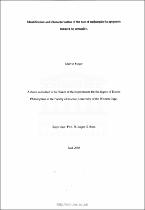Identification and characterisation of the role of endozepine in apoptosis induced by ceramide
Abstract
Apoptosis is a form of programmed cell death and is required for the normal development, tissue homeostasis and survival of organisms. The identification of mutations that can lead to alterations in cell death not only contributes to our understanding of this process, but it can also provide us with novel therapeutic targets to treat diseases such as cancer. Defects in the regulation of apoptosis contribute to a number of human diseases, e.g. excessive down regulation of this process has been linked to the development of cancer while excessive up regulation causes autoimmune and neurodegenerative disorders such as Alzheimer's disease. Genes involved in the regulation of cell death
present good opportunities as possible drug targets to treat these diseases. This research describes the identification of a gene that may be involved in the regulation of cell death induced via the mitochondrial apoptotic pathway. Promoter-trap retroviral insertional mutagenesis was used to randomly introduce mutations in pseudohaploid CHO22 cells. Retroviral mutagenesis was followed by selection for apoptosis resistant clones using Cr-ceramide. The viral integration sites in one of these mutants were characterised and led to the identification of a gene coding for an acyl-CoA binding protein, called endozepine. This protein is capable of displacing benzodiazepines from the peripheral
benzodiazepine receptor (PBR). The PBR forms part of the mitochondrial permeability transition pore (MPTP). Mitochondrial permeability transition has been demonstrated to play a key role in apoptosis. It has also been shown that ligands to the PBR induce mitochondrial permeability transition in isolated mitochondria by collapsing the inner mitochondrial transmembrane potential. This study demonstrates
that endozepine may regulate apoptosis by acting as an endogenous ligand to PBR facilitating mitochondrial permeability transition in cells.

